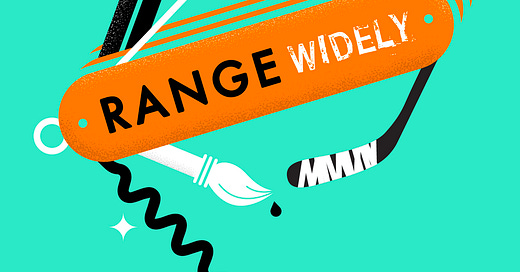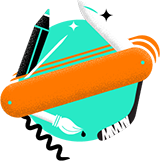My Personal "Attention Span" Takeaways
A short post with some of my personal tactical changes
Last week, in a live virtual Q&A, I interviewed Dr. Gloria Mark about her book, Attention Span: A Groundbreaking Way to Restore Balance, Happiness and Productivity.
Nobody has spent more time monitoring how people focus (or fail to focus) at work than Dr. Mark. You can view a recording of our chat here, but I wanted to share a short list of changes I’ve made to my own work tactics after reading Dr. Mark’s book and some of her papers:
Rather than planning to work for hours straight with intense focus, I recognize that this is rarely (if ever) possible, and instead work in planned intervals — periods of 45 minutes or an hour of serious focus, followed by short breaks where I use what Mark calls my “Little Mind” to do something enjoyable and less intense. (This can be as brief as writing — or even just reading — a haiku, or as long as exercising or taking a walk.)
At the start of each interval, I remind myself of my larger strategic goal. Mark has found that reminding oneself of the goal of the work aids focus, but only briefly — for about an hour.
When I make my rough plan for a workday (often the night before), I simply list fewer things than I used to. We often overestimate how much we can get done in a given time (the “planning fallacy”; more on that here), and switching tasks is more costly than we realize. Mark likens the brain to a whiteboard: when you switch tasks there’s a “residue” left, like the faint writing after you erase a whiteboard, which makes it difficult to switch abruptly without compromising focus.
I never start my day with email — a big shift for me. Unfinished tasks tend to leave a sort of mental post-it note in our brains reminding us to come back, which can undermine focus for other work. Given that my inbox always leaves me with a list of unfinished tasks, I try to attend to my strategic goal for the day before my inbox. Speaking of email, in a study Mark found that people checked email 77 times a day on average. She suggests email batching: set a specific time or two each day to triage and deal with email, rather than letting it interrupt every other task all day long.
One of the really interesting findings in Mark’s research is that we become accustomed to a particular cadence of interruptions to our focus, and will unwittingly maintain it. If we’re interrupted by external notifications all day long, even if those notifications magically disappear overnight, we’ll increase our “self-interrupting” (i.e., thinking about other things to check) in order to maintain the same frequency of distraction. In an attempt to combat that, I’ve turned off basically all notifications to lower the rate of external distractions, and I batch my notification checking rather than doing it throughout the day. And because some level of self-interruption is inevitable, I keep a pad on my desk where I write down distracting thoughts as they occur so that they aren’t leaving post-its all over my digressive brain.
Lastly, for a while I was keeping a journal to study my “attentional rhythm.” This basically amounted to paying attention to my attention: at what time and under what circumstances did I find it easy to focus. (Dan Pink’s excellent book When also influenced me on this front.) I then used that knowledge to plan accordingly, using easy-focus times for difficult work, and doing more administrative tasks when I tend to be less laser-focused. Becoming a student of my own attentional rhythm has been both interesting and useful.
This is, of course, a work in progress. But, as Mark told me, it’s not just that managing our focus improves our work, it also helps manage stress. Mark has used heart rate monitors and thermal imaging to gauge stress at work, and the bottom line is that people find constant task switching really stressful.
Thanks for reading. If you’re trying anything to manage your own attention, I’d be interested to hear about it in the comments below.
If you found any of these thoughts useful, please consider sharing this post.
As always, you can subscribe here.
Until next time…
David






I love these tips. As an independent consultant, I've struggled with the sense that I might miss an inquiry requiring a rapid response, but in the last year+ that I've avoided phone-based email I've only had one small project that I wasn't able to respond to in time. I could still do (much) better at focusing; when on my computer I tend to notice when I get a message and engage too soon.
I've also started having the conversation about communication norms explicitly with clients up-front: "Part of the value that I bring and how I keep my rates reasonable is that you are only paying for focused, productive time on your project. You don't pay for my lunch break, bathroom break, or when I have to take a break to let the plumber in and show her which sink needs unclogging. The corollary of that is that it may take me a little longer to respond, as I may be in meetings with other clients or otherwise unable to respond immediately. If you want to reserve specific time as "on-call" where I commit to being completely available to you, we can talk about that as an add-on." So far no one's opted for the add-on, and it's made me feel more confident managing my schedule better, rather than grappling with guilt over my "slow responses."
This was fascinating, David. As a classical pianist who grew up practicing for 4+ hours a day, I've been shocked to see my attention span shrink over the past 10 years.
Some of the things I've been doing to keep it from falling to that scary 47-second average:
- I never check email on my phone.
- I have a rule: input before output (or create before consume). That means no email or social media in the morning before writing.
- I use Readwise to save articles to read later, in the evening. Half the time, I find I'm not that interested to read them after all.
- Batching random info searches. Instead of looking things up as soon as I think them ("does whole cream break a fast?"), I keep a scratch pad at my desk and write down the questions I'm curious to know and schedule a time to look them up.
- I've had success using an app like Focusmate to have the accountability of someone sitting on the other side of the screen while I work on a specific task.